Haiti. A Better Future Through Education.
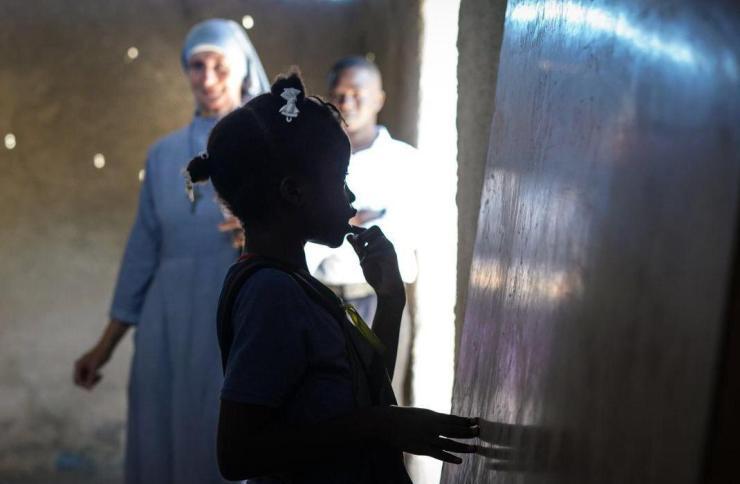
Sister Paësie Phillipe had been a missionary in Haiti for twenty five years when she founded the Kizito Family in 2017, a community that cares for, protects and educates vulnerable children living on the streets of the violent and dangerous slums of the country’s capital, Port-au-Prince.
Sister Paësie Phillipe who is originally from Nancy, France felt called to consecrated life at the age of 15. At 18, she joined the Missionaries of Charity, the congregation founded by Mother Teresa. After her formative years, she was sent on missions to Grenada, the southeastern Caribbean Sea, the United States, and Iceland. She arrived in Haiti in 1999, where the nuns cared for the sick, especially children, affected by tuberculosis, AIDS, typhoid, malaria, cholera and pneumonia.
Many children were orphans or had been left at the care centre by their parents, who never returned to pick them up.
Sister Paësie, despite loving this apostolate, realized that the children living in slums did not have access to education and that this keeps them in the condition of poverty and marginality. Public schools are free, but to attend them you need to purchase uniforms, books and other school supplies. To study in private schools, you have to pay fees which, although low, are impossible for needy families to pay.
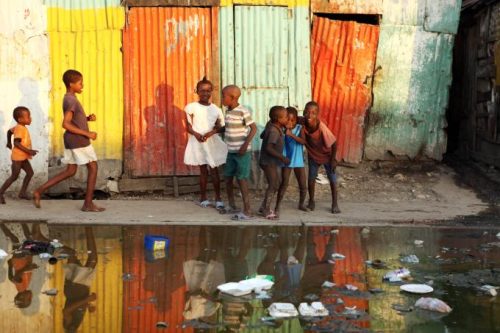
The Kizito Family serves 2,500 severely disadvantaged children in Cite Soleil, Haiti. iStock/ 1001nights
Adolescents and young people, living in the slums and who do not go to school quickly join gangs where they are exposed to violence, corruption and all kinds of degradation and many begin to beg or steal.
The Missionaries of Charity who are overwhelmed with caring for the sick, have no time to dedicate to the education of these children. “Every day, needy children come to us. We are overloaded with medical work, which takes precedence over education”, Sister Paësie recalls.
The young Sister felt a growing call to dedicate herself exclusively to the education of children and young people so, after having discussed the matter with her congregation and with the local bishop it was agreed that she leave her community while maintaining her four vows. Mother Teresa’s Sisters, in addition to the traditional vows of poverty, chastity and obedience, take a fourth vow of service to the poorest.
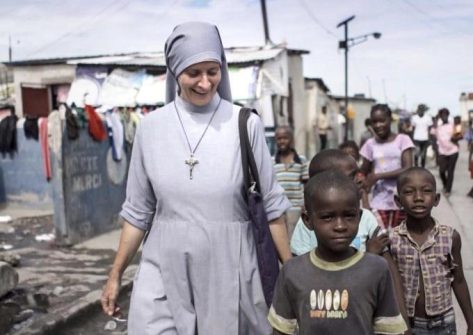
Sr. Paësie with some of the children in Cite Soleil, Haiti. The Kizito Family
On April 25, 2017, Sister Paësie left the house of the Missionaries of Charity in Delmas to dedicate herself to the new mission. She moved to Cité Soleil, the largest slum in Port-au-Prince, an area where violence, poverty and indifference coexist.
In the slums, homes are a jumble of houses and people survive from day to day by selling a bar of soap, laundry detergent or a handful of rice. Access to drinking water is difficult and expensive and families do not have sanitation facilities. When it rains, everything is flooded and when the sun shines, the heat is unbearable. Soon, some young women arrived who wanted to support Sister Paësie’s evangelizing work.
Sister Paësie’s founded the Kizito Family in 2017, a small community of consecrated women officially recognized in 2023 as an association of the faithful by the Archdiocese of Port-au-Prince. The name chosen for the community refers to Saint Kizito, the youngest of the group of 22 Ugandan martyrs canonized by Paul VI in 1964. The Sisters wear a grey-blue habit made of karabela, a traditional fabric used by the peasants and workers of the region.
Giving children a chance
The goal of the Kizito Family is to offer children living on the streets an opportunity to develop through education, care, nourishment and protection from all forms of violence.
In just a few years, the Kizito family created various types of structures in the heart of the slums of Cité Soleil, Petite-Goâve or Village de Dieu, which serve more than 2,500 disadvantaged children: they have seven family homes with 140 children of school age and whose family ties are traced; eight schools attended by 1100 pupils, with canteens to provide them with nutritious food; three centres for extracurricular activities (dance, football, sewing, embroidery, drawing, schooling support) and in which 700 minors are involved.
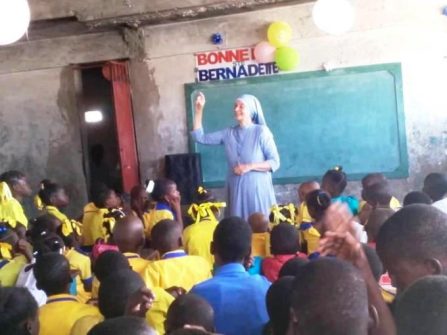
There are eight schools attended by 1100 pupils. The Kizito Family
There are also six catechetical centres with the participation of 700 children and young people because the spiritual poverty also needs to be overcome with adequate Christian formation. “Very poor children do not have access to the sacraments. They don’t go to church because they don’t have the necessary clothes and, on the other hand, the parishes usually ask them to make offerings, which is also an obstacle”, comments one of the leaders, Sister Helena Sánchez.
The challenge of violence
However, educators do face challenges and difficulties. “When they were on the streets, some of our young people were involved in gangs and many were victims of sexual abuse, some have continued with bad habits but they have chosen to leave the streets, the transition isn’t easy and it’s a process which takes place gradually”.
But the biggest challenge they face is the intense and indiscriminate violence that is spreading in the neighbourhoods of Port-au-Prince, both because a gang controls the territory and because of clashes between different armed groups. There are currently more than 300 armed groups that control 80% of the capital.
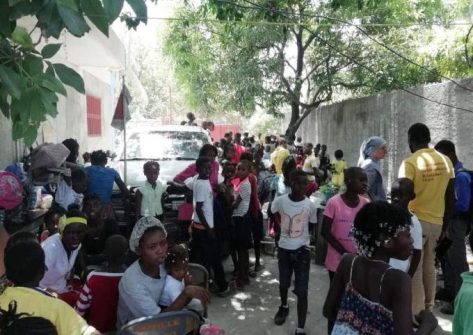
According to United Nations data, violence has displaced more than 300,000 inhabitants in Haiti’s capital. The Kizito Family
According to United Nations data, violence has displaced more than 300,000 inhabitants in Haiti’s capital. Thousands of people live in precarious conditions and are forced to flee from one neighbourhood to another, leaving behind what little they have. Sr. Paësie says that almost every week “new neighbourhoods are invaded” and therefore on every occasion “thousands of people have to flee and often cannot return to their homes.” Because when a neighbourhood is invaded by a new gang, the people there no longer feel safe. Many people have died trying to return home. Most of the time, people turn to a member of their own family who initially takes them in but this only lasts a few days before the situation becomes unsustainable.
Families already live in small houses, often with ten people in one room and when a new family arrives, it is really difficult. Furthermore, most of the time people arrive empty-handed because they have lost everything and depend on the family that welcomes them. “Today – says the Sister – we see people sleeping on the streets with their children, something that didn’t exist before in Port-au-Prince”. The actions of the armed groups, which had existed for years in the slums, have spread to other areas of the city. “The gangs have become more and more powerful and are not only found in the poor neighbourhoods but in practically all the neighbourhoods of the capital and also in several cities in the interior. The poorest people live day to day, depending on markets where they can find a little food and menial jobs but when the situation worsens, when there is violence in the streets with shootings and barricades, the markets cannot function. This significantly increases poverty and hunger”, the missionary says.
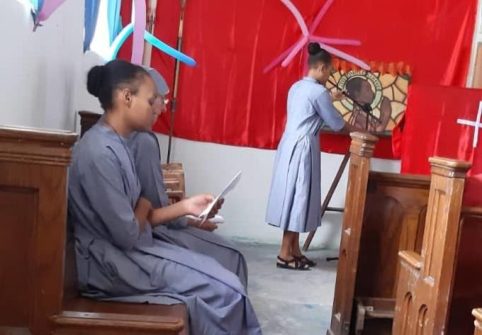
Sisters Fanette, Paësie and Bergeline are members of the Kizito Family, a small community of consecrated women. The Kizito Family
Despite living in this dramatic social context of growing violence, with disastrous consequences for Haitians, Sister Paësie does not lose hope. In these dramatic moments, she strongly believes in the presence of God. “He is there for them. He may be present through me or in some other way. But he never abandons his children,” she says.
On February 3, around 1 pm, Sr. Paësie answered the phone. On the other end of the line was Pope Francis. The nun admits that she was moved. She listened to the Holy Father, who wanted to know about the situation on the island, thank her and encourage her to continue her mission. She confesses that what surprised her most was the pope’s voice: “I felt great sweetness and goodness.”
She concluded: “The Pope’s message was not just for me, it was truly a gesture towards the children and the poorest of Haiti”. (Open Photo:The Kizito Family)
Bernardino Frutuoso



